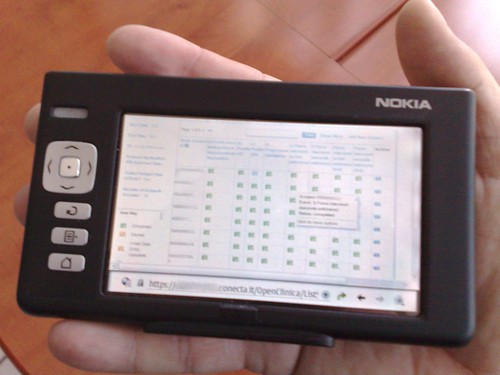Archive for April 8th, 2009
Another hypocrite post: “Open Source After ‘Jacobsen v. Katzer’”
Posted by cdaffara in OSS business models, OSS data, divertissements on April 8th, 2009
The reality is that I am unable to resist. To see a post containing idiotic comments on open source, masqueraded as a serious article, makes me start giggling with “I have to write them something” (my coworkers are used to it – they sometimes comment with “another post is arriving” or something more humorous). The post of today is a nicely written essay from Jonathan Moskin, Howard Wettan and Adam Turkelon Law.com, with the title “Open Source After ‘Jacobsen v. Katzer’”, referring to a recent US Federal Circuit decision. The main point of the ruling is “…the Federal Circuit’s recognition that the terms in an open source license can create enforceable conditions to use of copyrighted materials”; that is, the fact that software licenses (in this case, the Artistic License) that limit redistribution are enforceable. Not only this, but the fact that the enforceability is also transferable: “because Jacobsen confirmed that a licensee can be liable for copyright infringement for violating the conditions of an open source license, the original copyright owner may now have standing to sue all downstream licensees for copyright infringement, even absent direct contractual privity”.
This is the starting point for a funny tirade like: “Before Jacobsen v. Katzer, commercial software developers often avoided incorporating open source components in their offerings for fear of being stripped of ownership rights. Following Jacobsen, commercial software developers should be even more cautious“(the article headline in the Law.com front page) to “It is perhaps also the most feared for its requirement that any source code compiled with any GPL-licensed source code be publicly disclosed upon distribution — often referred to as infection.” (emphasis mine).
Infection??
And the closing points: “Before Jacobsen v. Katzer, commercial software developers already often avoided incorporating open source components in their offerings for fear of being stripped of ownership rights. While software development benefits from peer review and transparency of process facilitated by open source, the resulting licenses, by their terms, could require those using any open source code to disclose all associated source code and distribute incorporated works royalty-free. Following Jacobsen v. Katzer, commercial software developers should be even more cautious of incorporating any open source code in their offerings. Potentially far greater monetary remedies (not to mention continued availability of equitable relief) make this vehicle one train to board with caution.”
Let’s skip the fact that the law practitioners that wrote this jewel of law journalism are part of the firm White & Case that represented Microsoft in the EU Commission’s first antitrust action; let’s skip the fact that terms like “infection” and the liberal use of “commercial” hides the same error already presented in other pearls of legal wisdom already debated here, the reality is that the entire frame of reference is based on an assumption that I heard the first time from a lawyer working for a quite large firm: that since open source software is “free”, companies are entitled to do whatever they want with it.
Of course it’s a simplification – I know many lawyers and paralegals that are incredibly smart (Carlo Piana comes to mind), but to this people I propose the following gedankenexperiment: imagine that within the text of the linked article every mention to “open source” was magically replaced with “proprietary source code”. The federal circuit ruling would more or less stay unmodified, but the comment of the writers would assume quite hysterical properties. Because they would argue that proprietary software is extremely dangerous, because if Microsoft (just as an example) found parts of its source code included inside of another product, they would sue the hell out of the poor developer, that would be unable to use the “Cisco defence”: to claim that Open Source “crept into” its products and thus damages should be minimal. The reality is that the entire article is written with a focus that is non-differentiating: in this sense, there is no difference between OSS and proprietary code. Exactly like for proprietary software, taking open source code without respecting the license is not allowed (the RIAA would say that it is “stealing”, and that the company is a “pirate”).
So, dear customers of White & Case, stay away from open source at all costs – while we will continue to reap its benefits.
See you in Brussels: the European OpenClinica meeting
Posted by cdaffara in OSS business models, OSS data, blog on April 8th, 2009
In a few days, the 14th of April, I will be attending as a panelist the first European OpenClinica meeting, in the “regulatory considerations” panel. It will be a wonderful opportunity to meet all the other OpenClinica users and developers, and in general talk and share experiences. As I will stay there for the evening, I would love to invite all friends and open source enthusiasts that happen to be in Brussels that night for a chat and a Belgian beer.
As for those that are not aware of OpenClinica: it is a shining example of open source software for health care; it is a Java-based server system that allows to create secure web forms for clinical data acquisition (and much more). The OpenClinica software platform supports clinical data submission, validation, and annotation; data filtering and extraction, study auditing, de-identification of Protected Health Information (PHI) and much more. It is distributed under the LGPL, and does have some really nice features (like the design of forms using spreadsheets – extremely intuitive).
We have used it in several regional and national trials, and even trialed it as a mobile data acquisition platform.

If you can’t be in Brussels, but are interested in open source health care, check out OpenClinica.